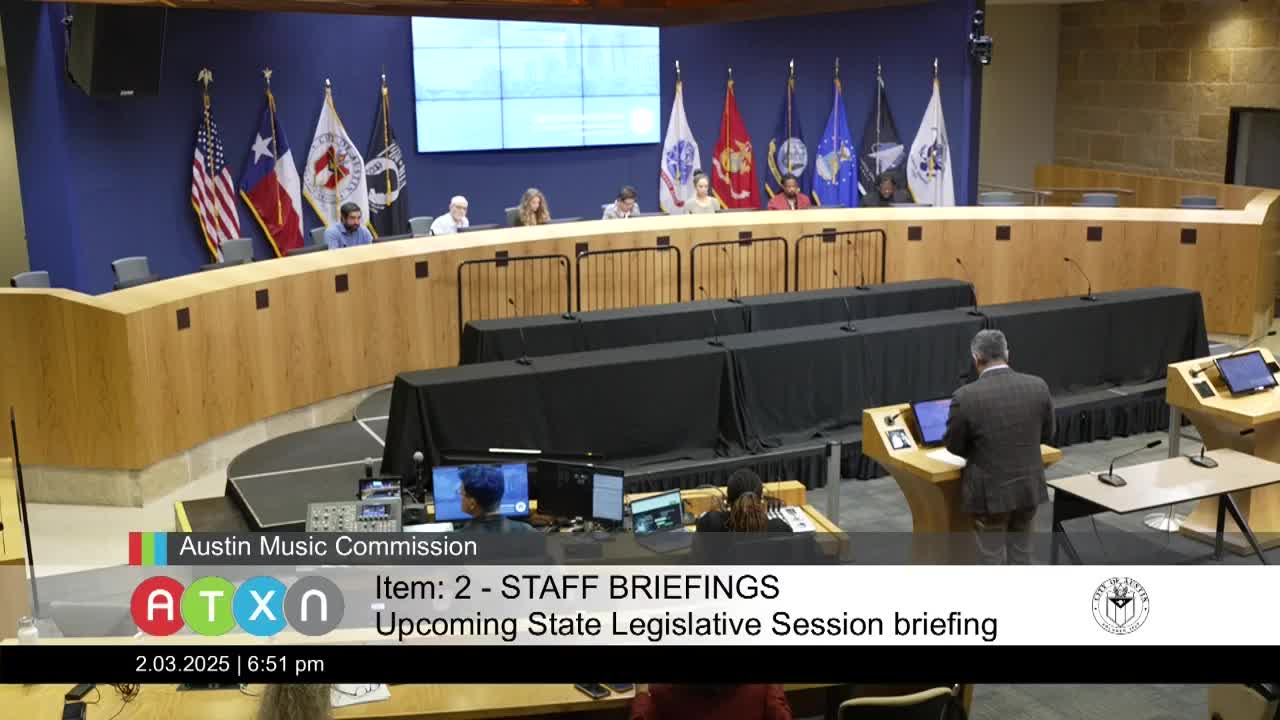City briefing warns state bills could affect Austin music, events and DEI programs
Get AI-powered insights, summaries, and transcripts
Subscribe
Summary
The City of Austin's Intergovernmental Relations officer briefed the Music Commission on dozens of bills filed in the Texas Legislature that could affect city authority, event permitting and diversity, equity and inclusion programs, including proposed restrictions on municipal lobbying, DEI language and proposals limiting local control.
Rick Ramirez, deputy Intergovernmental Relations officer for the City of Austin, briefed the Music Commission on key bills filed in the Texas Legislature that city staff will monitor during the 80th session.
Ramirez framed the session as “politically charged,” noting a new speaker of the Texas House and a larger freshman class. He urged the commission to track measures that could directly affect municipal authority, the hotel and events economy and programs funded locally.
Several bills Ramirez highlighted would have direct implications for live music and city-run events. He described proposals that would restrict local hiring of lobbyists and cap local expenditures, and a bill he said would restrict event organizers from prohibiting firearms at events held on government property. “If it is an event that's held on city or government property … the event organizer cannot prohibit the use of firearms on there,” Ramirez said, adding that the change could affect where out-of-state event organizers choose to hold festivals.
Ramirez also called attention to a set of bills on diversity, equity and inclusion that would, in his words, prohibit a governmental entity from maintaining a DEI program and — in one filed bill — bar city officials from using a list of listed terms in official positions and materials. He said staff are reviewing those measures for impacts on grant programs and other funding tied to local offices.
Other items Ramirez mentioned included bills on annexation and extraterritorial jurisdiction (ETJ), municipal debt restrictions, data-sharing for homelessness services and an early-stage artificial intelligence bill. He urged the commission to rely on staff for updates: “When you see articles that say it passed the House or it passed the Senate, it just passed that house. Until you read an article that says it is a new law, that's when you know the bill has finally made the final hurdle,” he said.
Commissioners asked for clarification on timing and impact. Ramirez said effective dates vary by bill and that the Intergovernmental Relations Office will notify departments and attempt to seek extensions to compliance deadlines if a bill's effective date would make city compliance impracticable.
The briefing underscored several themes of concern for music and events stakeholders: potential restrictions on local contracting or spending, the possibility that event rules would change for government property, and uncertainty about how state-level directives could affect city-funded arts and cultural programs. Ramirez offered to send the commission follow-up materials and to serve as a contact for further questions.
No formal action was taken; the briefing was informational and the commission recorded questions for staff follow-up.
